#variants of hera
Photo


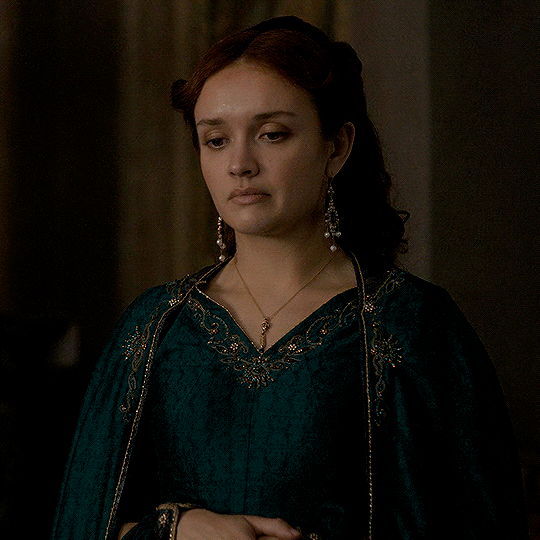






𝐓𝐡𝐞 𝐕𝐚𝐫𝐢𝐚𝐧𝐭𝐬 𝐚𝐧𝐝 𝐃𝐚𝐮𝐠𝐡𝐭𝐞𝐫𝐬 𝐨𝐟 𝐇𝐞𝐫𝐚/𝐉𝐮𝐧𝐨
These women can be summed up in two words: fierce and caring. It may seem like they do not care for many, and that may be true. But those they do care about, well, no one will ever harm them.
The variants and daughters of Hera/Juno are hard but have good hearts. They can also destroy a person, a place, and even a family. They’re women that you never want to be in a fight with. Because they can, and will, do anything to win.
𝑅𝑜𝑠𝑎𝑙𝑖𝑒 𝐻𝑎𝑙𝑒
𝑁𝑎𝑟𝑐𝑖𝑠𝑠𝑎 𝑀𝑎𝑙𝑓𝑜𝑦
𝐴𝑙𝑖𝑐𝑒𝑛𝑡 𝐻𝑖𝑔𝘩𝑡𝑜𝑤𝑒𝑟
𝑀𝑎𝑑𝑑𝑦 𝑃𝑒𝑟𝑒𝑧
𝑍𝑜𝑦𝑎 𝑁𝑎𝑧𝑦𝑎𝑙𝑒𝑛𝑠𝑘𝑦
𝐶𝑒𝑟𝑠𝑒𝑖 𝐿𝑎𝑛𝑛𝑖𝑠𝑡𝑒𝑟
𝑁𝑒𝑠𝑡𝑎 𝐴𝑟𝑐𝘩𝑒𝑟𝑜𝑛
𝐵𝑒𝑡𝘩 𝐷𝑢𝑡𝑡𝑜𝑛
𝑃𝑜𝑙𝑙𝑦 𝐺𝑟𝑎𝑦
#variants#variant meme#nesta archeron#cersei lannister#variants of hera#daughters of hera#demigods#alicent hightower#narcissa malfoy#zoya nazyanelsky#beth dutton#rosalie hale#euphoria#maddy perez#harry potter#percy jackson#greek mythology#juno variants#daughters of juno#roman mythology#female rage
265 notes
·
View notes
Text
Athena, who just popped out Zeus’ forehead perfectly clad with armor and battlegear: I only have a father, I think?
Hera, who has waited for this moment her whole life: DIBSSS!!!
41 notes
·
View notes
Text
I really don't have a problem with people changing the birth order of Kronos and Rhea's children in retellings, unless they make Hera or Hestia the middle daughter (odd as this choice is I've in fact seen it) or Hades the eldest child (a pretty common thing to find in stories).
The fact that Hera has the same status among the female children of Kronos as Zeus does among the males, whether that is as the oldest (like in the Iliad) or as the youngest (like in the Theogony) is unlikely to be a coincidence. It is also not a coincidence that out of all six siblings Hera and Zeus are the only ones who sometimes are imagined as actual twins, where the oldest/youngest daughter and son model doesn't seem to apply, but where the affinity between them is emphasised even more. In any case, regardless of how much accounts may vary,Hera is never the middle daughter, and I feel that this is quite important not just because of her position in relation to Zeus, but also because of her being called, in the Iliad at least, the most venerable daughter of Kronos and best of the goddesses by both birth and marriage.
Hestia is almost always named first when the children of Kronos and Rhea are listed, and in Homeric Hymn 5 she is called both oldest and youngest.
As for Hades, there is just no reason why he should be the eldest of his siblings. He is never presented as such in any source, his sisters are always older than him, and sometimes he can even be the youngest of his brothers. Surely it is possible to make him special in a story without giving to him the roles of other gods? Surely it is not so intolerable if the goddesses are born before him?
#the regular version has this order:#hestia#demeter#hera#hades#poseidon#zeus#but sometimes Zeus is listed first of his brothers and then it goes: Hestia Demeter Hera Zeus Poseidon Hades. or Zeus Hades Poseidon#and then the Euhemeristic variants difer even more. For example Hestia and Demeter aren't daughters of Kronos and Rhea#ramblings#greek mythology#greek gods
48 notes
·
View notes
Text




takashi okazaki

#takashi okazaki#star wars#marvel#ahsoka#variant#comic#graphic novel#shin hati#baylan skoll#sabine wren#hera syndulla#c1-10p#chopper
15 notes
·
View notes
Text
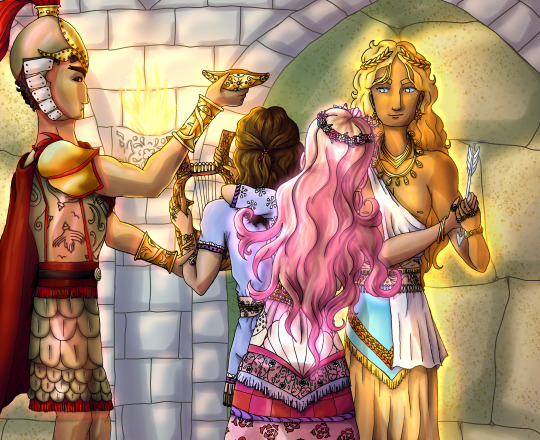
Paris + The Gods
please pretend that it looks like ares is taking the crown from paris instead of giving a crown to paris because having paris actively hand it over didn't work with the rest of the concept for this drawing
also please pretend that it actually looks like aphrodite is leaning over instead of looking like she's the same height as paris - a lot of the shading i used to indicate that she wasn't standing up straight got killed by the glowy hair effects
bonus flats + simpler shading under the cut, bonus ramblings in the tags
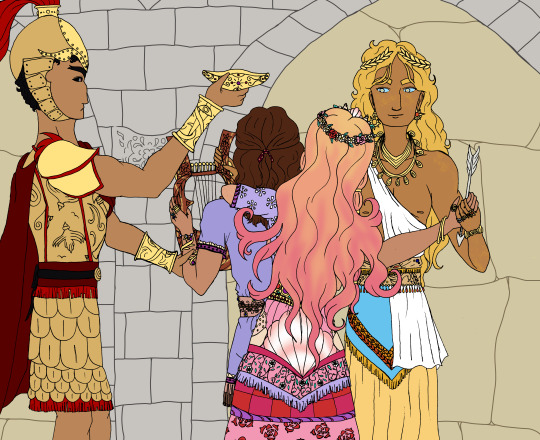

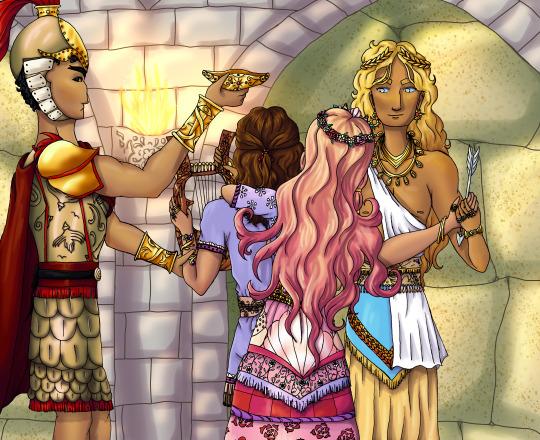
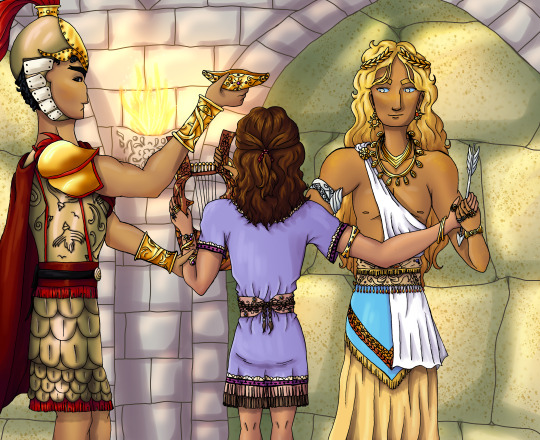
#paris of troy#aphrodite#apollo#ares#this drawing was inspired by me talking with a friend about the trojan royal family#and realizing that even for someone from a family with a lot of connection to the gods#paris has a *lot* of connection to the gods#i mean the connection to aphrodite should be. obvious#and there's also the story of ares for some reason deciding to enter a bull contest that paris was holding#(for those who aren't aware of this story: ares wins and paris gives him a crown as a prize)#and then paris was skilled with a bow and a lyre which would have been in apollo's domains#and the variant of achilles death i've seen most has apollo working with paris to kill achilles#(which means it was paris who apollo went to avenge hector and also apollo's son(s) that achilles killed)#and paris's first wife was a nymph and his second wife was a demigod#also this is stretching things but you could argue there's something to be said#for how athena - who (according to one account of tiresias's story) had blinded a mortal man for seeing her naked -#and hera - who had reason to not be very fond of trojan princes -#were both willing to accept a mortal trojan prince as their judge#and were both willing to offer up extremely generous rewards#although i do say that that's stretching since you could also just say they both wanted the apple badly enough#to accept the judge and offer up those prizes no matter who the judge was#also it has occured to me that since paris is also called alexander#everyone in this drawing has a name that starts with 'A'#anyway i think the joke i made to my friend is that paris might be godnip#like catnip. but for gods. godnip.#my art
44 notes
·
View notes
Text

Star Wars #44 (Marvel, March 2024) Rebels 10th Anniversary variant cover by Caspar Wijngaard
29 notes
·
View notes
Text

A MASTERPIECE OF THE FEMALE FORM -- A MASTERWORK OF FEMININE BEAUTY.
PIC(S) INFO: Resolution at 1946x2991 -- Mega spotlight on Dan Panosian Cover C Variant to "Wonder Woman" Vol. 6 #10 [part of the "Dawn of DC" event]. Published June 18, 2024. DC Comics.
Textless: 1031x1566.
Sources: www.previewsworld.com/Catalog/APR242867 & X.
#Wonder Woman#Dan Panosian Artist#Dan Panosian Art#Diana of Themyscira#Wonder Woman Wednesday#Cover Art#Dan Panosian#Urban Barbarian#Variant Cover#Comics#Wonder Woman Vol. 6: Dawn of DC#Wonder Woman Vol. 6#Dawn of DC Event#Dawn of DC#Wonder Woman 2024#2024#Ladies of DC#Female figure#Amazonian#DC Comics#DC Universe#Great Hera!#Women of DC#DC Ladies#Themyscira#DC Women#Female form#Female beauty#Lasso of Truth#Wonder Woman: Dawn of DC
7 notes
·
View notes
Text
have you ever wondered what would happen if c!aimsey, o!aimsey, au!aimsey, arg!aimsey, and other aimsey variants met? have you ever had the thought, man, this guy needs therapy! while watching aimsey lore? do you love hera (arg!guqqie)?
well BOY do i have the fic for you!
“Aimsey Variant Group Therapy” is 2.8k words of the most unserious but also sort of devastating(??) sunshipduo content. read it on ao3 and let me know what you think!
i had so much fun writing it. i hope you enjoy :] <3
#fic#writing#aimsey#aimsey fanart#guqqie#guqqie fanart#sunshipduo#sunshipduo fanart#guqqie arg#hera (arg!guqqie)#c!aimsey#au!aimsey#arg!aimsey#o!aimsey#a!aimsey#q!aimsey#p!aimsey#s!aimsey#r!aimsey#enjoy <3#greenhouse au#area unknown#area unknown smp
141 notes
·
View notes
Text

A bunch of doodles of Hera’s youth bc I really enjoy the variant where Hera wasn’t eaten by Kronos and was raised by Oceanus and Tethys. It just has so much potential y’know?
#greek mythology#ancient greek mythology#greek pantheon#hera#greek goddess#hera goddess#hera deity#hera greek mythology#scamander#xanthus#metis goddess#Metis#eurynome#Thetis#Thetis goddess#Tethys#titans#greek goddesses#Oceanids
115 notes
·
View notes
Text
so Chinese has a lot of words to differentiate relatives, whether they're on your mother's or father's side, their relative age to the connecting parent, etc etc
Amusingly, Hera addresses herself as 姨婆 (maternal grandmother's sister) instead of some variant of 婶婶 (paternal (younger) uncle's wife)

The Goddess of Marriage, Queen of Olympus, does not acknowledge her husband lmao
#hades 2#hades 2 spoilers#I also had to make too many (ie 3) baidu searches to report a mistake about how Mel is related to Circe lsdfjksdf#though tbh in Chinese it would make more sense if she tried drawing the family tree on the ground and proceeded to simply gave up#because nobody has taught her the word for “mother's mother's-side-female-cousin” (yes there is a Chinese word for it.)
33 notes
·
View notes
Photo









𝐓𝐡𝐞 𝐕𝐚𝐫𝐢𝐚𝐧𝐭𝐬 𝐚𝐧𝐝 𝐒𝐨𝐧𝐬 𝐨𝐟 𝐇𝐞𝐫𝐚/𝐉𝐮𝐧𝐨
Logical and decisive, these men know what they want and how to get it. Each has many things in common; ruthlessness, ambition, leader of the family/group/nation. They think they know best, or that their ideas trump all others.
𝑇𝑦𝑤𝑖𝑛 𝐿𝑎𝑛𝑛𝑖𝑠𝑡𝑒𝑟
𝐾𝑙𝑎𝑢𝑠 𝑀𝑖𝑘𝑎𝑒𝑙𝑠𝑜𝑛
𝑇𝘩𝑟𝑎𝑛𝑑𝑢𝑖𝑙
𝑆𝑐𝑎𝑟
𝑈𝑙𝑡𝑟𝑜𝑛
𝑇𝘩𝑒 𝐷𝑎𝑟𝑘𝑙𝑖𝑛𝑔
𝑂𝑡𝑡𝑜 𝐻𝑖𝑔𝘩𝑡𝑜𝑤𝑒𝑟
𝑃𝑟𝑒𝑠𝑖𝑑𝑒𝑛𝑡 𝑆𝑛𝑜𝑤
𝑇𝑜𝑛𝑦 𝑆𝑜𝑝𝑟𝑎𝑛𝑜
#hera#hera variants#the variants and sons of hera/juno#juno#variants#variants meme#witchthewriter#tywin lannister#klaus mikaelson#thranduil#scar#ultron#the darkling#otto hightower#president snow#tony soprano
148 notes
·
View notes
Text
Some general thoughts on the gods on Troy's side, and why they might be:
Aphrodite: Presumably out of affection for her son, Anchises, and Paris. Very potentially, wanting to assure the gift she's given Paris lasts as long as possible? But if this is a factor, hardly something she is beholden to in any way; it'd probably be more about her own pride in that case.
But, given that she also helps protect Hektor's corpse, when he, at least, is no longer able to pay her back for such aid, her affection/aid to the Trojans aren't just for or because of those three.
Apollo: Thetis' warning/prophecy to her son that killing Tennes/a son of Apollo would mean Apollo would kill him (Plutarch, Quaest. Graec. 28, Bibliotethe, Epitome 3.26), then we have Achilles killing Troilus in his sancuary, which would be reason enough on its own but Troilus can also be Apollo's son. There's Apollo so ardently protecting Hektor throughout the war, even/maybe especially after his death (Hektor is also in several sources Apollo's son).
Also his relationship with Hecuba and how in Stesichorus he rescues her. (Could also put Kassandra and Helenos here.)
Part of his defense of Troy might be about "fate" and when it's the "proper time" for Troy to fall, but Apollo's ties to Troy/individuals attached to Troy are more deep-set than that. He is the one to punish Neoptolemos' sacrilege of killing Priam at Zeus' altar. Apollo is also rarely present during vase art scenes around the Judgment, potentially connecting to; Apollo specifically being the one to aid Paris (or in some variants, using Paris' shape) to kill Achilles. Real-world wise, the possibility of connecting Apaliuna(s)/Appaluwa as Wilusa/Troy's patron god to Apollo.
Ares: Unstable ally. Hard to say how consistently he is on either side; Athena says he "only yesterday" on the first day of fighting in the Iliad was loudly pledging to Hera and Athena that he'd help the Achaeans.
Perhaps he's been aiding the Trojans more or less secretly/openly throughout the war, as much because he supports whatever side he wishes on a whim as that Aphrodite (and Apollo?) has asked him to. Either way, certainly not as consistent nor out of any particular affection or feeling of protectiveness for the Trojans.
Artemis: "For, in her pity, holy Artemis is angry at the winged hounds of her father, for they sacrifice a wretched timorous thing, together with her young, before she has brought them forth. An abomination to her is the eagles' feast." (Agamemnon, Aeschylus, line 135) ; this is about the eagles and hare omen, which replaces (or in addition to, as this seems to have happened in Mycenae) the snake and sparrows one. Artemis is put forth as unhappy with Troy's (future) fall/the war.
And, it's of course very easy to see the demand for Iphigenia in reparation for Agamemnon's hubris in a similar way, that if he/the army, wants to go off and kill/enslave innocents elsewhere, he/they has to start at home. She may also be helping her brother, and there is the Skamandrios, son of Strophios, who she herself taught to hunt in the Iliad.
She has independent connections to Troy, and could be one of the more focused on Trojan deities along with her brother and their mother.
Leto: We have nothing, aside from the fact that she is on the Trojan side with her children in Book 21.
But real-world-wise, there's also that Leto was an important goddess on the coast, and in Lycia connected to a Lycian mother goddess. So one could probably make inference for the in-universe reason being as much her siding with her children as that Troy is honouring her (maybe particularly so), along with the rest of the countries on the coast.
Xanthos: intimately woven together with Troy's royal family, as he's married a couple daughters into the line and his (only?) son's daughter married Dardanos.
Zeus: He's technically/actually neutral, a driving force to keep the war going as it "needs to". He's therefore on Troy's side more through the sentiment(s) he expresses or is assigned to him rather than in action.
Particularly so if one turns to the "he planned the war" variants - but these are never about Troy, or Paris, but rather about something much larger than any fault any individual Trojan or Troy has a whole as made themselves guilty of. [Though individual mortals in the Iliad, and in later sources, both tragedies and lyric, will imply that it's Zeus as god of xenia that ensures his working towards Troy's destruction, rather than any plan that has little to do with Troy.]
For his connections to and being for Troy, have Proclus' summary of the Kypria for example, where the plan mentioned at the end is to "relieve the Trojans" specifically, and that phrasing turns Achilles' anger and Zeus acting to fulfil his demands not about Achilles' honour, but about aiding Troy. In Pindar's Paean 6 (fragmentary), Zeus is said to "not dare to change fate [the destruction of Troy]", easily to implicate that he otherwise might, because he would wish to.
More important, perhaps, is his statement that Troy is his most favoured city, and how Hera offers up three of her favoured cities for Zeus' one, how he wishes to save Hektor, and the description in the Iliad (by Poseidon) that Dardanos was the/one of the sons [by mortal women, though Elektra couldn't have been that] that he loves the most.
46 notes
·
View notes
Note
Athena & Ares can time travel too. There are versions where they are born during the titanomachy and killed some titans. Lol
Athena killing Pallas is actually my canon fr
#ares can go kill some titans too hes a good boy#i think theres a variant of hephaestus born in during the titan war too#tho he is a child of hera AND zeus and hera had to lie and say he was just hers#since they werent married lol#asks#athena#ares#greek mythology
11 notes
·
View notes
Text
The odd detail about Hera being raised by Tethys and Okeanos (and probably the main reason why the idea never held much appeal to me) is that it supposedly happened while Zeus was fighting Kronos, as Hera herself relates: „... Ocean, the source of the gods, and mother Tethys, who in their house nurtured me well and raised me, after receiving me from Rhea, when far-thundering Zeus set Cronus down beneath the earth and murmuring sea.” (Iliad 14.200 ff)
So not only does this suggest that Hera didn't participate in the Titanomachy at all, but even that she was an actual child at the time which is just… weird and uncomfortable especially since Zeus was presumably an adult.
#one could change this in a reimagining of course but I can't forget the way it is originally related#my favorite variant is the one where she is raised by nymphs in Argolis because it connects her so closely with her main center of worship#and also the one in which she is raised by her own parents of course#hera#greek mythology#tethys#okeanos#ramblings#titanomachy
15 notes
·
View notes
Text
The myth of Dionysos (2)
If you haven't checked the first post, this is a vague translation of an article originally written in French by Alain Moreau for the Dictionary of Literary Myths. Its subject is the identity and depiction of Dionysos/Dionysus in Antiquity.
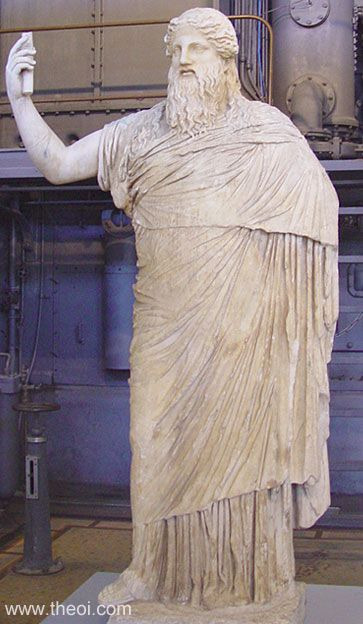
III) The shapeshifting god
A god with such elusive origins, and such an ability to easily cross the limit between life and death, will of course be difficult to depict visually. Ancient sculptors had selected three main appearances for Dionysos: as a child, held within the arms of Hermes or of a satyr ; as a large, imposing bearded man (this was his usual depiction during the Archaic era), or as an effeminate teenager with shoulder-length curly hair and graceful, sensual gestures (this appearance became the dominant one from the 4th century onward). When it comes to prayers and hymns to Dionysos, he receives many names: Bakchos, Bakcheus, Iakchos, Sabazios, Bromios, Zagreus… G. Wentzel collected more than a hundred and thirty name variants for the god.
But how can one describe a god who spends his days transformed or under a disguise? Before the giant Rhetos, he is a lion (Horace, Odes, II, 19) ; when he flees from Typhon he is a male goat (Antoninus Liberalius, Metamorphoses, 28 ; Ovid, Metamorphoses, V) ; at Nysa he is a baby goat (Apollodorus, III) ; before the terrified Tyrrhenian pirates of the Homeric hymn he becomes a lion and a bear ; for Pentheus he was a bull and a ghost ; for the Minyades he was a bull, a panther and a lion (Antoninus Liberalis, Metamorphoses, 10). Dionysos keeps shapeshifting, becoming a ghost, becoming a reflection or creating doubles of himself – and in this sense, the mirror that the Titans offered to the child they were about to kill becomes a very important symbol. In the “Bacchants”, the audience slowly sees Pentheus transformed into a tragic double of Dionysos: both are young, beardless and with beautiful blond hair. However in the beginning of the play, those similarities only highlight the differences. Dionysos is effeminate and his long curls flow over his shoulders, while Pentheus’ hair is braided and wrapped around his head – as Jeanne Roux notes, it was the typical hairdo of aristocrats that regularly practiced sports and wrestling. The virile king of Thebes disdains the foreigner because he has perfume in his hair, Aphrodite’s charm in his eyes, and something feminine in his appearance. But to better destroy Pentheus, Dionysos will turn him into a copy of himself. To spy on the Bacchants, Pentheus will put on a woman’s dress, unbraid his hair, cover himself with a fawn’s skin and hold a thyrsus. (Here the author notes that the translator of the Belles Lettres edition of the play made a mistake by writing that Pentheus put on a “wig” as part of his disguise – no, he actually simply unbraids his hair). With this new appearance, and soon succumbing to the delirium, Pentheus imagines himself cradled within the arms of his mother, just like young Dionysos disguised as a girl was cradled by his foster mother Ino. But by identifying with the god, Pentheus marks his own destruction: the “agreus” of the verse 1192 reminds us of “Zagreus”. Pentheus will live the fate of Dionysos-Zagreus: killed and dismembered, but without the resurrection. Supreme though futile identification: Agave holding the head of her son believes she is brandishing the corpse of a lion… the lion being one of Dionysos’ favorite transformations. When playing double, Dionysos always win.

IV) A complex personality
In his childhood, Dionysos is presented as a frail and defenseless being. He flees in terror the hatred of Hera and Lycurgus ; he naively falls into the trap of the Titans. However, once he is an adult, it is him who entraps those that refuse to recognize his divine power, and he takes his revenge with an horrifying cruelty. The Minyades are plunged into a sacred madness and rip to pieces Hippasos, one of their sons, while believing him to be a young fawn. Pentheus falls from the top of a pine-tree and is ripped apart by the Bacchantes, among which are his aunts, and his own mother Agave. As for Lycurgus, poets and mythologists are constant rivals in the game of who will describe the most atrocious torment. In Eschilus’ Lycurgy, Dionysos turns him mad and he kills his son Dryas with an axe, believing him to be a vine. According to Hyginus, Lycurgus also kills his wife and tries to rape his mother, before Dionysos abandons him at the top of a mountain where he is mauled by panthers. According to Homer, Zeus makes the king blind, while in Apollodorus’ tale he is tied up to the mount Pangaion and devoured by horses. And for Diodorus of Sicily, he had his eyes pierced by Dionysos, before a long series of tortures culminating with a crucifixion.
However this bloodthirsty god of tragedies can easily become a god of comical fables, or of fairytales. It is Dionysos that brought back Hephaistos to Olympus so he could deliver Hera from the magical throne he had trapped her in – to do so, Dionysos made the smith-god drunk, placed him on the back of a donkey and dragged him in such a parade to the realm of the gods (this was a frequent motif of Ancient Greek art). The donkey is strongly associated with the parades of Dionysos: either it is the ride of the god himself, either it is the ride of big-bellied Silenus, so heavy the beast clearly has troubles carrying him. The donkey is an ithyphallic animal: sometimes, baskets are depicted hanging from his phallus, or Silenus is depicted trying to rape it. This is all within the context of grotesque pranks and caricatural jokes – a carnival. This carnival-nature of Dionysos explains why he appears, with frequent mentions of his donkeys, within Aristophanes’ comedy “The Frogs”, where he is depicted as a farting and cowardly buffoon.
But the jester can become a lover. Dionysos is the lover of Ariadne. According to the most ancient versions, they were united by a “hieros gamos”, a sacred wedding – Ariadne being an ancient goddess of vegetation. In more recent tales, the hero Theseus becomes the third part of a love triangle – and Dionysos either recomforts Ariadne at Naxos after she was abandoned by Theseus (Catullus wrote a beautiful poem on this subject), either is neglected by Ariadne and out of jealousy uses the arrows of Artemis to kill his unfaithful companion (Odyssey, XI).
But even in his loves, Dionysos stays elusive. A curious tale, most developed by Clement of Alexandria in his Protrepticus (II), transforms the heterosexual lover of Ariadne into the homosexual lover of Prosumnos. And this is the result of a bargain: if Prosumnos gives Dionysos the means to go into the Underworld, the young god promises to become his “eromenos” (teenage lover) – but when Dionysos comes back from the Hades, Prosumnos is dead. So, going to his grave, he cuts a fig-tree branch, sculpts it in the shape of a phallus, and uses it to “fulfill his promise to the dead”. And according to Clement of Alexandria, it is in honor of this legendary episode that in some cities there are parades of phalluses organized in honor of Dionysos.
Naïve child and manipulative adult, a god as cruel as buffoonish, heterosexual and homosexual, Dionysos’ personality is just as multi-faceted and impossible to simplify as his physical appearance.
58 notes
·
View notes
Text
"When Zeus took control in the heavens, he wielded his power excessively, committing many
willful acts. Poseidon, Hera and Apollo wished to subjugate him by tying him up. When Thetis heard the plot against Zeus from her father, Nereus (he was a seer), she hurried to him, leading forth as an ally Aigaion to terrify the conspiring gods. He was a sea-god and judged against his
father, Poseidon. When Zeus heard Thetis’ message, he hung Hera up in the fetters she intended for him and sentenced Poseidon and Apollo to serve Laomedon." - Schol. (D) Il. 1.399
A lot of interesting details in this version: first, the variant that Aigaion is Poseidon's son — as opposed to his son in law like in the Theogony 817, or his defeated opponent in Schol. Apoll. 1.165 (I adore all of his associations with the sea so much) — probably to explain Homer's comment that he's greater than his father. Second that Thetis learns about the coup from Nereus, and third, and this is what really got my attention, the detail that Zeus binds Hera in the golden chains she'd reserved for him.
#greek mythology#greek myths#greek gods#tagamemnon#hellenic deities#I have to make a post about Briareos/Aigaion soon#hera#zeus#poseidon#apollo#Aigaion#Briareos#Hekatoncheires
31 notes
·
View notes